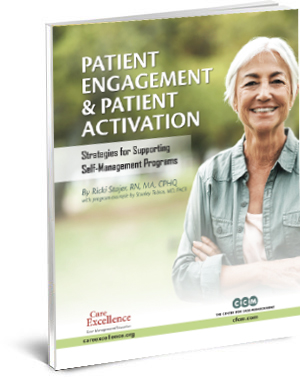Effective Care for High-Need Patients II is a collection of self-paced, online modules that equip hospital case managers and case management teams with evidence-based strategies, skills, and resources for improving care for patients with complex conditions or life circumstances that can negatively impact their health.
Case Management Training Made Easy – Take the Whole Course or Individual Modules
Developed in collaboration with the California Hospital Association, this course features eight modules that focus on:
- Physical Disabilities
- Substance Use Disorders
- Managing Pain and Chronic Opioid Abuse
- Frail Older Adults
- Transplant Care
- Pregnancy Care
- Pediatrics
- Immigrant Communities
Patients within these special populations are at increased risk for poor health, have difficulty accessing quality healthcare, and account for a disproportionate share of healthcare spending. Hospital care managers play a crucial role in ensuring these vulnerable patients receive effective care that addresses their unique needs.
This course is perfect for RN case managers, social work case managers and care coordinators working in acute care, skilled nursing, long-term care or clinic settings.
Each module examines historical and societal contexts for each population; potential biases, myths, and misconceptions affecting a specific patient population; communication strategies, symptom management tools, and other approaches that case managers can utilize to address patient needs; and available resources across the continuum of care that can be part of a discharge plan.
Learners will master a wide range of learning objectives, including how to:
- Describe the core identifying factors of a physical disability, the needs of the physically disabled, and the challenges faced by family members
- Understand the difference between Medicare and Medicaid benefits for the disabled, and the Disability Competent Care Model
- Define the evaluation process that leads to selection and listing of patients for transplant, discuss methods to determine wait times, and name psychosocial factors/criteria that are considered
- Identify populations that have difficulty meeting transplant criteria or navigating the transplantation process
- Describe or define different types of pain, guidelines and best practices for an effective pain management program, and co-occurring psychosocial or behavior concerns associated with pain
- Identify persons at risk for opioid abuse or dependence, and develop and apply collaborative treatment plans that can safely and effectively manage pain without opioid use
- Classify the various categories of caregivers and types of care options for older patients when care at home is not an option, and identify key features of each
- Recognize chronic medical conditions affecting older Americans and the impact they have for patients, families, and healthcare systems
- Identify the key responsibilities case managers have for managing transitions of care for older hospitalized patients
- Explain the sequence and standards for routine obstetric care, the need for specialized common interventions within this population, and common causes of morbidity
- Describe available resources for pregnant women, information pertinent to obtaining insurance and medical care in this population, and cultural and social barriers that can pose challenges to accessing care
- Describe unique issues related to the care of children and their families, common conditions and symptoms among children who have high care needs, and insurance and coverage issues for children with serious and chronic illnesses
- Understand the types of medical devices commonly used in children with serious and chronic illnesses, and a framework for discharge planning that optimizes transitions in care across the care continuum
- Explore the opportunities immigrants have for healthcare insurance, barriers to coverage, and attitudes toward healthcare among various immigrant populations
- Understand available programs and resources for immigrant populations, and best practices for cultural competency and communication
Care Excellence’s courses for hospital care managers give you exactly what you need, when you need it. Utilizing a state-of-the-art learning management system, the curriculum is interactive and engaging, utilizing case studies, pre- and post-tests, and other resources to maximize learning and retention.
Call us at 760-750-4006 to purchase multiple modules or if you need assistance designing a custom combination of solutions!
Get Your Complimentary eBook
“Patient Engagement & Patient Activation: Strategies for Supporting Self-Management Programs”
This eBook examines the evidence base surrounding patient engagement that leads to effective self-management, models that enhance patient activation, and more.
Contact Us About This Case Management Course
[contact-form-7 id=”1899″ title=”Hosp Effective Care for High-Need Patients II”]
Course Modules |
Care Excellence’s courses for hospital care managers have been designed to give you exactly what you need, when you need it. Utilizing a state-of-the-art learning management system, the curriculum is interactive and engaging, utilizing case studies, pre- and post-tests, and other resources to maximize learning and retention. Take the entire Effective Care for High-Need Patients II course, or laser focus your training on any combination of the modules below to address specific challenges.
Call us at 760-750-4006 to purchase multiple modules or if you need assistance designing a custom combination of solutions!
Join the Interest List!
Fast Facts |
The Effective Care for High-Need Patients II course is available online and can be purchased both in its entirety or piecemeal by modules. Please call us for more information.
| Is taught: | Completely online, via self-paced courses |
| Begins: | Online modules are available immediately upon registration |
| Costs: | $493 per course (see module description for individual pricing) |
| Requires: | Computing skills sufficient to complete graduate work, access to a computer with an Internet connection. |
| Is ideal for: | New or experienced inpatient care managers, care coordinators, or discharge planners working in hospitals, skilled nursing centers, and long-term care facilities |
| Provides: | 16 Continuing Education hours upon successful completion |
| Refund Policy: | Course is non-refundable once it has been accessed |

